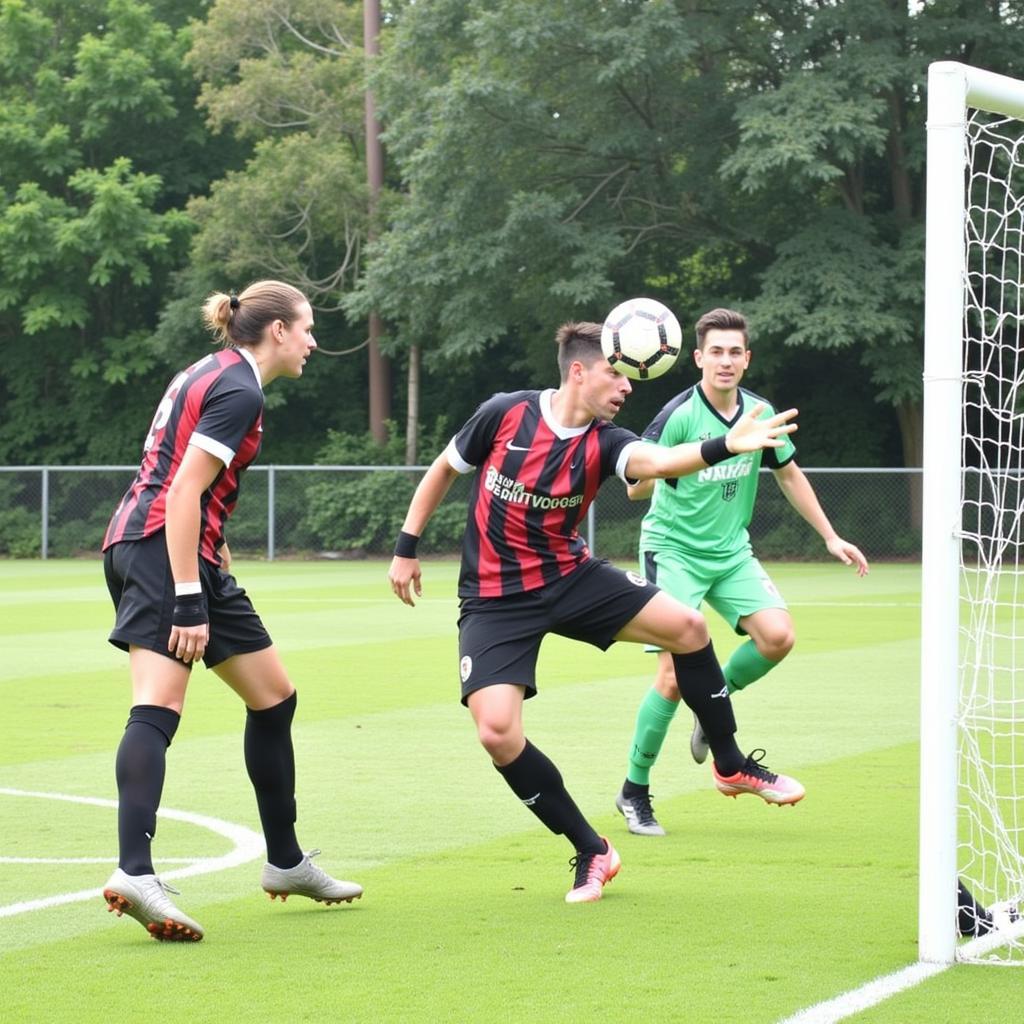When Can You Pick Up the Ball When a Player Passes Back?
December 6, 2024Understanding when a goalkeeper can handle the ball after a back-pass is crucial for any football player. It’s a rule that can drastically change the flow of a game and often leads to confusion and debate, even at the highest level. This article dives into the specifics of this often-misunderstood rule, explaining when it’s legal and when it’s not, and offering insights to help you master this aspect of the beautiful game.
The Back-Pass Rule Explained
The back-pass rule, formally Law 12 in the Laws of the Game, prevents goalkeepers from handling the ball when it’s deliberately passed back to them by a teammate using their foot or lower leg. This rule was introduced in 1992 to discourage time-wasting and encourage more dynamic, attacking play. The key word here is “deliberately.” The referee must judge the intent of the pass.
What Constitutes a Deliberate Back-Pass?
A deliberate back-pass is deemed to have occurred when a teammate intentionally kicks the ball to their goalkeeper. It’s not about the direction the ball travels, but rather the manner in which it’s played. A mis-hit clearance, a deflection, or a ball unintentionally played backwards don’t fall under this rule. The goalkeeper is permitted to handle the ball in these situations.
When Can the Goalkeeper Handle the Ball?
The goalkeeper can handle the ball if the back-pass is:
- Headed: A header back to the goalkeeper is perfectly legal and they can handle the ball.
- Chested: Similarly, if the ball is chested back, the goalkeeper can pick it up.
- Deflected: If the ball deflects off an opponent or a teammate (unintentionally), the goalkeeper can handle it.
- Unintentional: A miskicked clearance that ends up going towards the goalkeeper doesn’t constitute a deliberate back-pass and the goalkeeper can handle the ball.
 Goalkeeper Handling Headed Backpass
Goalkeeper Handling Headed Backpass
Interpreting the Referee’s Decision
The referee’s judgment plays a vital role in interpreting the back-pass rule. They must assess the situation and determine whether the back-pass was deliberate or not. This involves considering factors such as the player’s body positioning, the angle of the pass, and the overall context of the play. This can be a subjective decision, leading to occasional controversy.
Common Misconceptions about the Back-Pass Rule
- Any pass from a teammate: It is a common misconception that any pass from a teammate to the goalkeeper is illegal. This is not true; only deliberate passes with the foot or lower leg are penalized.
- Direction of the pass: The direction of the pass is not the determining factor. Even a sideways pass can be considered a back-pass if played deliberately with the foot.
Mastering the Back-Pass Rule: Tips for Players
- Communication: Clear communication between teammates, especially defenders and the goalkeeper, is essential.
- Awareness: Players should be aware of their positioning and the options available to them when under pressure.
- Training: Practicing alternative passing options, like heading or chesting the ball back, is crucial.
Conclusion
Understanding the nuances of when a goalkeeper can pick up the ball after a back-pass is crucial for both players and fans alike. By understanding the rule and its interpretations, you can avoid costly mistakes and appreciate the strategic complexities of the game. Mastering this rule will undoubtedly enhance your understanding and enjoyment of football.
FAQs
- What is the penalty for a back-pass infringement? An indirect free kick is awarded to the opposing team from the spot where the goalkeeper handled the ball.
- Can a goalkeeper handle a back-pass with their thigh? No, handling the ball after a deliberate pass with any part of the leg below the knee is an infringement.
- Can a goalkeeper kick the ball after receiving a deliberate back-pass? Yes, the goalkeeper can kick or otherwise play the ball with their feet after receiving a deliberate back-pass. They just cannot handle it.
- Does the back-pass rule apply in all forms of football? Yes, the back-pass rule is a standard part of the Laws of the Game and applies globally.
- What is the purpose of the back-pass rule? The rule was introduced to prevent time-wasting and promote a more attacking style of play.
- Can the goalkeeper handle the ball if they receive a deliberate back-pass from a throw-in? Yes, the back-pass rule only applies to passes made with the foot or lower leg.
- Can the goalkeeper handle a backpass if the ball comes off an opponent first? Yes, if the ball touches an opponent before reaching the goalkeeper, even if initially deliberately passed by a teammate, the goalkeeper can handle the ball.
For further information on football rules and regulations, check out our other articles on “Offside Rule Explained” and “Understanding Handballs in Football”.
Need more support? Contact us 24/7: Phone: 0396443476, Email: fanhaaland@gmail.com or visit us at 23 Tháng 3, Đắk Nia, Gia Nghĩa, Đắk Nông, Việt Nam.